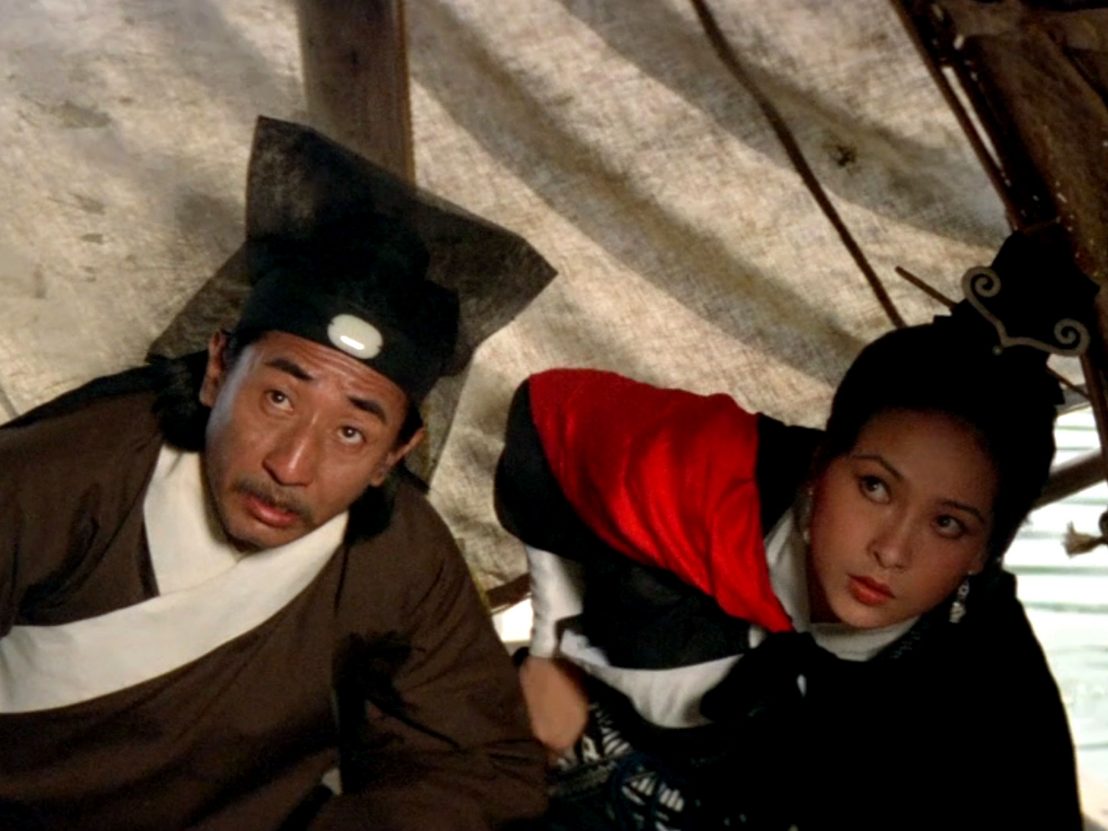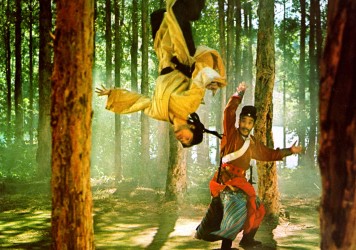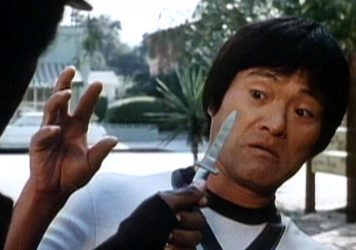
The opening of King Hu’s Raining in the Mountain tracks a party of three shot wide, on a journey through a range of natural landscapes and weathers. Their determined progression makes this look like a pilgrimage – an impression which appears to be confirmed by their destination, the secluded ‘Three Treasures’ temple in Ming Dynasty China (the Bulguksa temple complex in South Korea was used as the film’s shooting location).
Even after they have reached the outer gates, their journey is far from over, as these three profane travellers are slowly escorted by the monk Hui Ssu (Paul Chin Pei) through the vast precinct – and introduced, as we are, into the otherworldly serenity of the monastery’s environs. This prologue is also an initiation of sorts.
Of course, to enter this holy place is also to corrupt it, and Raining in the Mountain concerns itself with this interpenetration of the material and the transcendental, in a transient world where everything is always in motion. The ‘three treasures’ on which the temple was founded and for which it was named – “the Buddha, the Dharma and the Samgha [the monastic community]” – are decidedly of a spiritual rather worldly kind, but locked away in the temple’s Scripture Hall is a fourth treasure: a transcription of the Mahayana Sutra said to have been handwritten by the famous Tang Dynasty monk Xuanzang (aka Tripitaka) himself.
One of the three visitors, the wealthy landowner Esquire Wen (Sun Yueh), considers this scroll to be “priceless” and “one of a kind”, because “money can’t buy it” – and so he has hired White Fox (Hsu Feng) and Gold Lock (Wu Ming-tsai), under the respective guises of his concubine and valet, to steal this object for him during their stay.
The shifting value of the scroll is one of the film’s central themes. The district’s governor General Wang (Tien Feng) also considers it “a priceless treasure”, and also hopes to steal it via the underhanded operation of his lieutenant, the law officer (and ex-con) Chang Cheng (Chen Hui-lou). Yet even though White Fox scorns the monastery’s simple food, and deems the temple a “dump”, she considers the sutra nothing more than a “ragged old scroll”.
It’s a perspective which brings her into unexpected alignment with the monastery’s wise old Abbot (Kim Chang-Gean) – “it’s no treasure,” he says, “just a roll of tattered paper” – and with the Abbot’s equally wise lay advisor Master Wu Wai (Wu Chia-hsiang), who comments, “The old scroll has no real value.”
Ageing and ill, the Abbot has invited Esquire Wen and General Wang, as representatives of worldly wealth and power, to assist him in choosing a successor. Asked by Wu Wai if he has any criteria, the Abbot responds: “I have none. It doesn’t matter whether he is a monk or a layman, so long as he is enlightened.” That last proviso, of course, is harder to fulfil than it sounds.
In the running for this post are the monastery’s experienced treasurer Hui Wen (Lu Chun), who has Esquire Wen’s endorsement, and the younger Hui Tung (Shih Chun), whom General Wang supports, and the Abbot’s loyal disciple Ssu. But the ambition, corruptibility and even willingness to commit crimes harboured by two of these monks, and the potential divisiveness of the third, cast doubt over their fitness for a high office where both religious and political concerns must be reconciled.
Meanwhile, there is “a worldly matter to attend to”: the arrival of Chiu Ming (Tung Lin), a (falsely) convicted criminal who has purchased a permit to become a monk, and whose gratitude, forgiveness, uncomplaining service and Stoic submission to fate mark him as a better Buddhist than many of the monks around him. Various, variously thwarted attempts by White Fox, Gold Lock and Chaag Cheng to steal the Scroll are set against scenes in which the monks Wen, Tung and Ssu have their qualities formally tested by the Abbot and Wu Wai, so that every human action in the film is framed in moral and spiritual terms, and every character can – which is not to say will – choose to follow the path to enlightenment.
King Hu is most famous for the 1971 wuxia in which he seasoned martial arts with A Touch of Zen. In many ways Raining in the Mountain inverts that structure, weaving a small number of kung fu sequences into a much broader religious allegory. The Three Treasures Temple is a place of intrigue, where the holy and the secular clash and sometimes collaborate in a struggle to maintain balance. But this struggle is for the most part conducted peaceably, with theft, corruption and violence ultimately acknowledged as unwelcome intrusions to repent rather than norms to celebrate and embrace.
Ultimately, for all its sedate visual beauty and Henry Chan’s mobile camerawork, Raining in the Mountain privileges content over form, and locates “true value” in a text’s meaning rather than in its materiality. How appropriate, then, that the original 35mm reels should now be available on multiple DVD and Blu-ray copies in the Taiwan Film Institute’s 2K digital restoration, observing traditions while also adapting to a changing world. The film is well worth the viewer’s pilgrimage.
Raining in the Mountain is released on Dual-Format DVD Blu-ray by Eureka! Entertainment as part of their The Masters of Cinema Series in a 2K restoration on 24 February.
Published 24 Feb 2020

By Anton Bitel
King Hu’s seminal ’70s wuxia is finally arriving on Blu-ray and DVD later this month.

In praise of the Hong kong adrenaline junkie and architect of the time-honoured bullet ballet.

By Will Sloan
The Korean–American actor was an unlikely crossover star in the 1980s.